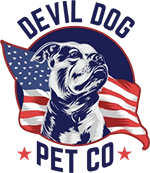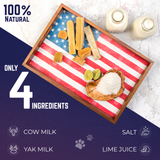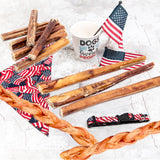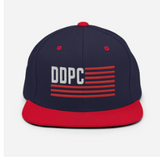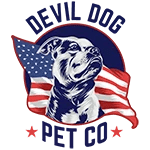Thanksgiving is a time for family, friends, and delicious feasts, but for our furry friends, it can sometimes be a source of stress. Amid the hustle and bustle, the increased noise, and the changes in routine, dogs can experience post-holiday stress that might manifest in various ways. It's important to recognize the signs and take steps to help your pup recover from the overload. Today, we’ll explore common causes of post-Thanksgiving holiday stress, how to identify if your pup is struggling, and actionable strategies to bring peace back to your pup's life.
Understanding Post-Thanksgiving Stress in Pups
Dogs thrive on routine and predictability. The disruption brought on by holidays like Thanksgiving can leave them feeling overwhelmed, anxious, and stressed. Some of the primary causes include:
- Changes in Routine: Dogs are creatures of habit. Thanksgiving often brings changes to their usual schedule, such as meal times, bathroom breaks, and walks. The sudden shift can cause confusion and anxiety, especially for dogs who rely on structure to feel secure.
- Overstimulation from Guests and Noise: Thanksgiving gatherings can mean a house full of unfamiliar faces, loud conversations, and children running around. The constant activity and noise may lead to sensory overload, causing stress in your pup, particularly if they are naturally shy or sensitive.
- Dietary Indiscretions: While those turkey scraps and pie crusts might seem like a treat, they can wreak havoc on your pup’s digestive system. Sudden dietary changes can lead to gastrointestinal issues, adding to your pup's stress during and after the holiday.
Signs of Stress in Your Pup
Every dog expresses stress differently, and recognizing the common signs can help you intervene early to bring them comfort. Here are some key indicators to watch for:
- Behavioral Changes: Dogs under stress might become unusually withdrawn or clingy. They might also show signs of irritability, such as growling or snapping, even in situations where they’re usually calm. Other dogs might bark excessively, chew destructively, or pace nervously.
- Physical Symptoms: Shaking, panting, or hiding are physical indications that your pup is anxious. Some dogs might cower under furniture or retreat to a secluded area of the house. Yawning and licking their lips can also be signs of stress, even if there isn’t an obvious trigger.
- Changes in Eating or Bathroom Habits: A stressed dog might refuse to eat, or conversely, overeat if they’ve been given scraps from the Thanksgiving table. Stress can also manifest in digestive issues like diarrhea or constipation, as well as more frequent or fewer bathroom breaks.
Preparing for the Holiday Ahead of Time
Preparation is key to minimizing your pup’s post-Thanksgiving holiday stress and taking proactive steps can make a big difference. Gradual acclimatization to increased activity is essential if your pup isn’t used to large groups of people. You can start by inviting a few friends over before the holiday, allowing your pup to get accustomed to new faces in a more controlled and less overwhelming environment. This gradual exposure will help them feel more comfortable when the bigger holiday gatherings occur.

Equally important is maintaining your pup’s routine. Try to stick as closely as possible to their usual schedule, ensuring they are fed at the same times, taken for their regular walks, and given enough exercise and bathroom breaks. Dogs thrive on consistency, and keeping their routine intact will provide them with a much-needed sense of security amidst the holiday chaos.
Finally, creating a safe space for your pup is vital. Set up a designated quiet area where they can retreat when they feel overwhelmed. This could be a cozy room with their bed, favorite toys, and calming elements such as soft music or treats. Make sure your guests understand that this space is off-limits, allowing your pup to relax and decompress without interruptions.
Immediate Stress-Relief Techniques
If your pup experiences stress during Thanksgiving, there are several immediate strategies you can use to help alleviate their anxiety. First, guide your pup to their designated quiet area if the environment becomes too overwhelming. A quieter room, away from the main gathering, can provide a peaceful retreat and help reduce their stress. In addition, calming techniques such as gentle massage or slow petting can soothe your pup. Finally, monitor your pup’s behavior closely throughout the day. If you notice signs of stress, like shaking or excessive panting, intervene early by leading them to a quieter space or offering a calming chew to help them relax. These immediate actions can help ensure your pup stays as calm and comfortable as possible during the holiday.
Post-Holiday Recovery Strategies
Once the festivities are over, your pup might need some extra care to fully recover from any holiday stress. Here are the steps to help them settle back into their normal routine:
- Return to Normal Routine: Get your pup back on their usual schedule as quickly as possible. Dogs thrive on predictability, and resuming familiar activities—regular mealtimes, walks, and play—will help them feel safe and secure.
- Extra Attention and Soothing Practices: Offer a little extra playtime, cuddles, or an extra walk to provide comfort and reassurance. Engaging with a favorite natural chew can also help your dog release any remaining tension, promoting relaxation and a calm state of mind.
- Dietary Reset: If your pup enjoyed too many holiday treats, consider a gentle reset with easily digestible foods like plain boiled chicken and rice. Gradually reintroducing their normal diet will help soothe any digestive upset caused by holiday indulgences.
When to Seek Professional Help
Most dogs bounce back quickly after a holiday, but if you notice persistent signs of stress, it may be time to seek professional help. If your pup continues to display anxiety-related behaviors such as hiding, trembling, or aggression, even

after their routine has returned to normal, a consultation with a veterinarian may be necessary. Chronic stress can also lead to more serious behavioral issues, including destructive chewing, separation anxiety, or heightened fearfulness, which often require professional intervention to prevent escalation. Don't hesitate to reach out for expert advice, as sometimes a fresh perspective can make all the difference in helping your pup regain a sense of calm and security.
Thanksgiving is a wonderful time to celebrate, but it’s important to remember that it can be overwhelming for your pup. By recognizing the signs of stress, preparing ahead of time, and offering post-holiday support, you can ensure your pup feels safe and loved throughout the season. With a little patience and care, your furry family member will recover from the holiday excitement and get back to their happy, healthy self.
